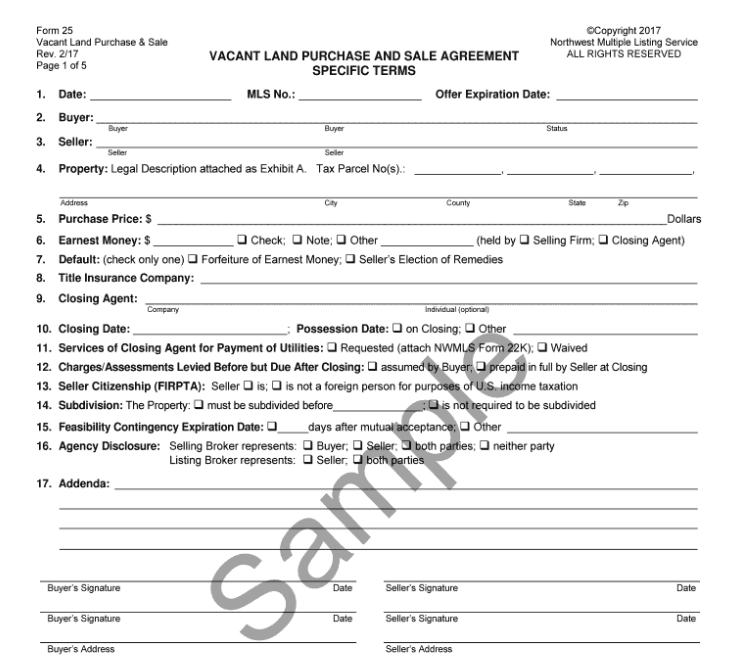Why Purchase and Sale Agreements are Important in Real Estate Transactions
There is a lot at stake in any real estate transaction. Whether you are purchasing a home, residential rental property, commercial property, or even a parcel of vacant land, buying real estate can be a big investment and a big risk. Selling property can be just as important. Whether you’re a real estate investor or you’re simply selling your personal residence, moving on can depend upon the successful and profitable sale of your current property.
Both the buyer and the seller must take care to fully protect their rights and interests—otherwise, they may experience significant losses due to undiscovered issues with the property, poorly-drafted sales contracts, or shoddy legal work. Any time you enter into a real estate transaction, you risk losing assets. Depending on the terms, you could lose your business, your personal wealth, or even your home. To limit your risk, you need to make sure that your purchase and sale agreement is properly drafted to protect you.
Purchase and Sale Agreements are Contracts
Like any other type of contract, a purchase and sale agreement is legally binding. If one party fails to adhere to the contract, the other party generally has the right to take legal action to recover the damages from any harm the first party’s failure to perform has caused. Additionally or alternatively, one party may sue to force the other party to perform under the terms and conditions of the contract.
It is always in your interest to fully understand the implications of every single term and condition in any contract you sign. This is especially true for purchase and sale agreements where the stakes are usually high.
Aside from the basic requirements for a valid contract (offer, acceptance, and consideration), there are no set terms for purchase and sale agreements. Many people use standardized forms, but this is often inadequate. The higher the stakes, the more important it is for the parties to finely parse out the conditions of the contract. The specific terms and complexity of any agreement depend on the nuances of the situation and on the desires of the parties. Thus, in some cases, a few pages will suffice, but in others, the purchase and sales agreements have to be much longer.
In contracts, every nuance matters. Thus, the more important the investment, the more important it is to have a contract that is tailored to your circumstances and crafted by a knowledgeable attorney who works with these kinds of real estate contracts routinely.
In negotiations, knowledge is power. Hiring a good attorney with an intimate understanding of contracts can put you in a better position to negotiate with the opposing party. He can push to include the nuanced language that protects your interests, and get you the most value possible.
Overseeing Commercial Real Estate Transactions
Generally speaking, when a buyer and seller agree to the terms and conditions of a proposed transaction for a commercial property, one party’s attorney will draft and send the initial purchase and sale agreement to the other party’s attorney. This agreement should usually contain the following basic terms and conditions:
- Legal description and address of the property in question
- Any terms for a sale “as-is”
- Description of transfer documents (for example, deed, bill of sale, assignment, etc.)
- Purchase price (either by a set amount or per square foot, which may be adjusted after a survey)
- Adjustments to the price to be made at closing
- Who holds the deposit (for example, title insurance company), and what happens to the deposit when the transaction fails or closes
- Any contingencies of either party, which can include inspections, clear title, lease review, land use permits, environmental issues, financing securement, and more
- Default provisions
- Representations and warranties made by the both parties
- Duties of the parties during the pending transaction, such as keeping up the property, insuring the property, and continued management of tenants
- Scope of broker involvement in the deal
- Assignment rights of the buyer
- Various boilerplate terms
- Information regarding closing
- Letter of intent
- Confidentiality agreement
In addition to the above terms and conditions, each purchase and sale agreement should contain provisions specifically tailored to the property in question. For example, the sale of a strip mall with multiple retail tenants will require different terms than the sale of an industrial warehouse or an undeveloped parcel of land. The contract should cover all the necessary issues relevant to your particular transaction.
Representing Home Buyers and Sellers
While residential real estate contracts are sometimes less complicated than commercial ones, these contracts can also contain unfavorable terms—and the parties may not notice until it is too late. A residential purchase and sale agreement should typically include the following basics terms:
- Legal description and address of the property
- Purchase price
- Earnest money deposit
- Down payment
- Financing contingency, if applicable
- Closing information
- Date to take possession
- Who holds the deposit (for example, a title insurance company) and what happens to the deposit if the transaction fails or closes
- Items that are and are not to be included in the sale
- Title guarantees advanced by either party
- Duties of the parties during the pending transaction, such as keeping up the property, paying utilities, taxes, and insurance
- Inspection contingencies and walk-through inspections
- Penalties for delayed possession caused by either party
- Contingencies on the sale of either party’s other home
- Seller’s Disclosure Statement
Whether you are a buyer or a seller, you should carefully check these contracts with an experienced lawyer who routinely reviews such documents to ensure that your rights are protected.



